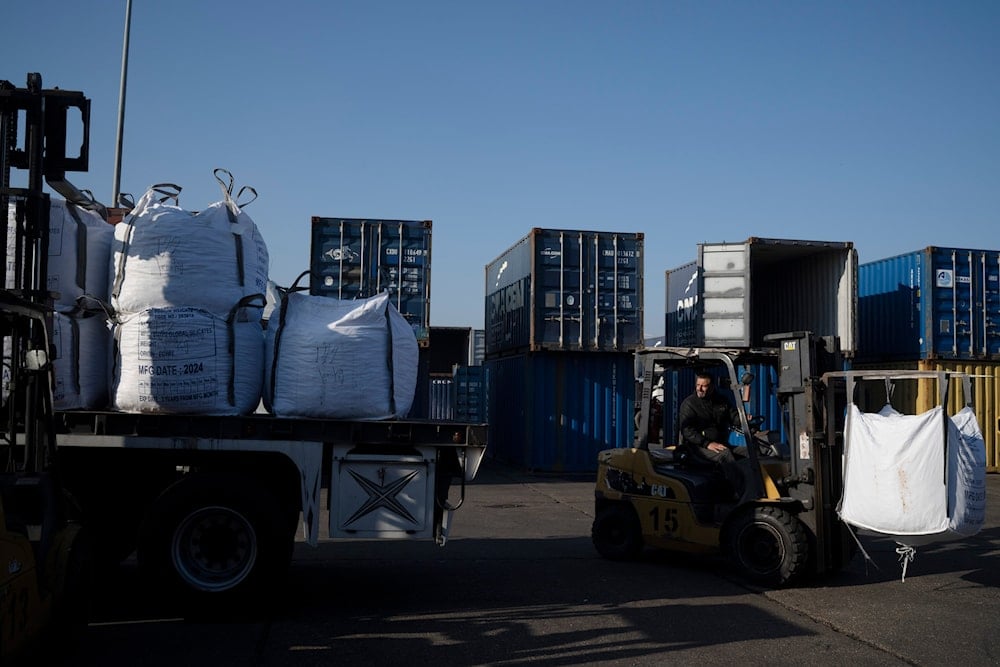Syria receives its first wheat shipment since Assad's ouster
The Syrian Port Authority announces the arrival of the first wheat shipment under the new administration.
-
 A Syrian worker transports a product at the port of Latakia, Syria, Tuesday, December 17, 2024 (AP)
A Syrian worker transports a product at the port of Latakia, Syria, Tuesday, December 17, 2024 (AP)
Syrian authorities reported that a wheat shipment reached the Mediterranean port of Latakia on Sunday, marking the first such delivery since the ouster of former ruler Bashar al-Assad in December, 2024.
The Syrian General Authority for Ports and Border Crossings stated in an announcement that "the first ship carrying wheat since the fall of the former regime arrived today at Latakia port, carrying 6,600 tonnes of wheat," without specifying the source of the shipment.
The authority shared an image of the Russian-flagged vessel Pola Marina, which, according to Marine Traffic data, had sailed from the port of Rostov-on-Don earlier this month.
"This shipment is part of ongoing efforts to secure basic needs and strengthen food security," stated the port authority, noting "the arrival of more vital supplies in the coming period."
The statement called the shipment "a clear indication of a new phase in economic recovery" in Syria.
Before the war broke out in Syria, domestic production had been sufficient to satisfy local demand, but harvests subsequently dropped to historic lows, forcing greater reliance on imported wheat, particularly from Russia, a key ally of the Assad government, without reaching a definitive conclusion.
An anonymous former official from Latakia port disclosed to AFP that before Assad's removal, the facility regularly received Russian wheat shipments at a rate of approximately one per month, with the source speaking on condition of anonymity to share this information about previous import patterns.
This latest shipment follows a February UNDP report warning that nine out of ten Syrians live in poverty while struggling with food insecurity, with the report further noting that by 2024, domestic wheat production was projected to meet just 65% of the country's consumption requirements.
This comes as the new Syrian administrations works on reviving the economy, which had been crippled with sanctions during 14 years of war.
US gives Syria sanction-relief conditions
The US has presented Syria with a set of conditions that Damascus must fulfill to obtain partial sanctions relief, including preventing foreigners from occupying senior government positions, according to six sources familiar with the matter cited by Reuters on March 25.
A US official and a Syrian source said that US Deputy Assistant Secretary for the Levant and Syria, Natasha Franceschi, presented these demands to Foreign Minister al-Shibani during a March 18 meeting held on the sidelines of the Syria donor conference in Brussels.
According to two US officials, a Syrian source, and additional Washington-based sources, the American conditions include Syria's complete destruction of any remaining chemical weapons stockpiles and full cooperation on counterterrorism efforts.
The United States also required that the new Syrian government abstains from putting foreign fighters in senior roles within the government, after Damascus previously appointed former foreign rebels, including Uyghurs, a Jordanian,
EU eases sanctions on Syria
The European Council of the European Union suspended in February several restrictive measures over the situation in Syria, adding that the decision comes as part of the EU's "efforts to support an inclusive political transition in Syria, and its swift economic recovery, reconstruction, and stabilization."
The Council indicated that the EU "aims to facilitate engagement with Syria, its people, and businesses, in key areas of energy and transport, as well as to facilitate financial and banking transactions associated with such sectors and those needed for humanitarian and reconstruction purposes."
The EU Council will suspend sanctions in the transport sector and energy sector, namely oil, gas, and electricity, in addition to removing five entities (Industrial Bank, Popular Credit Bank, Saving Bank, Agricultural Cooperative Bank, and Syrian Arab Airlines) from the list of those subject to a freeze in funds and economic assets.

 4 Min Read
4 Min Read










